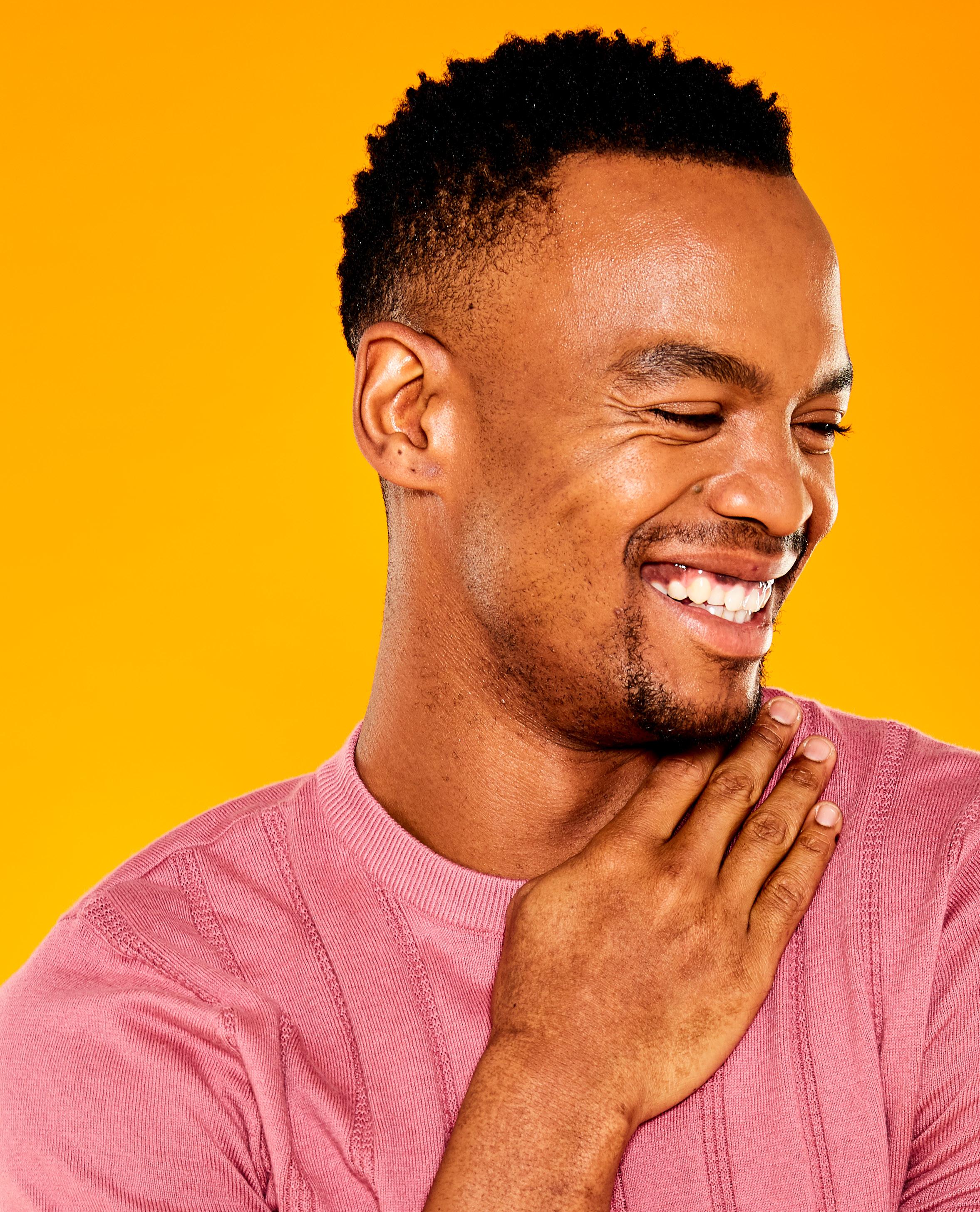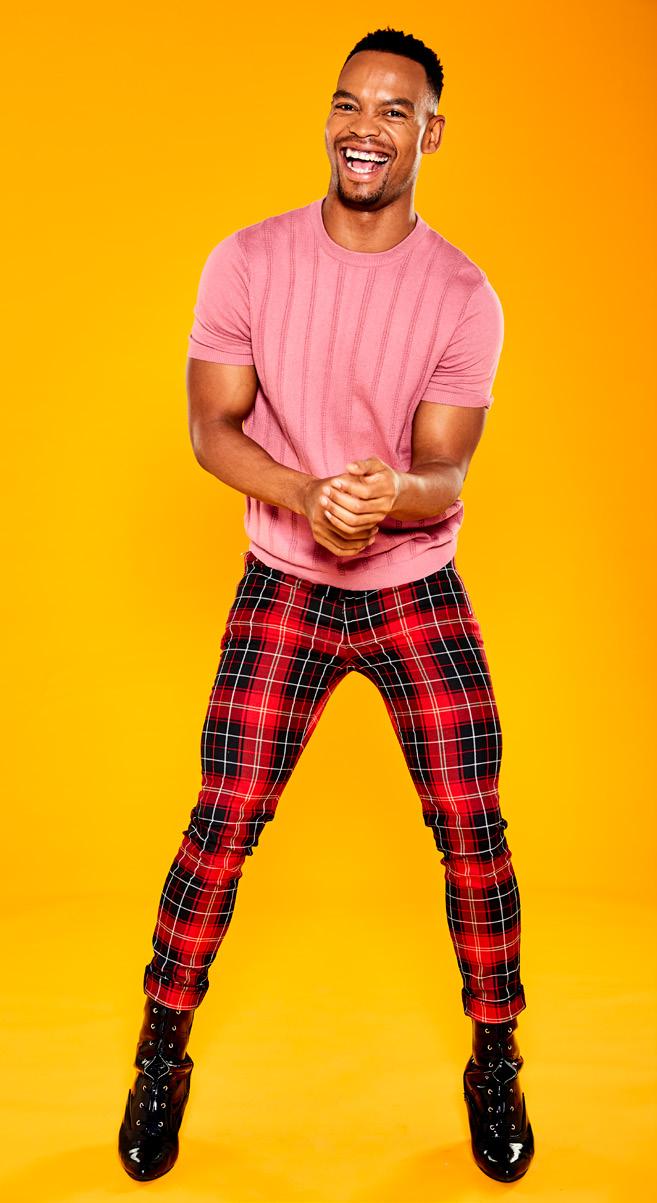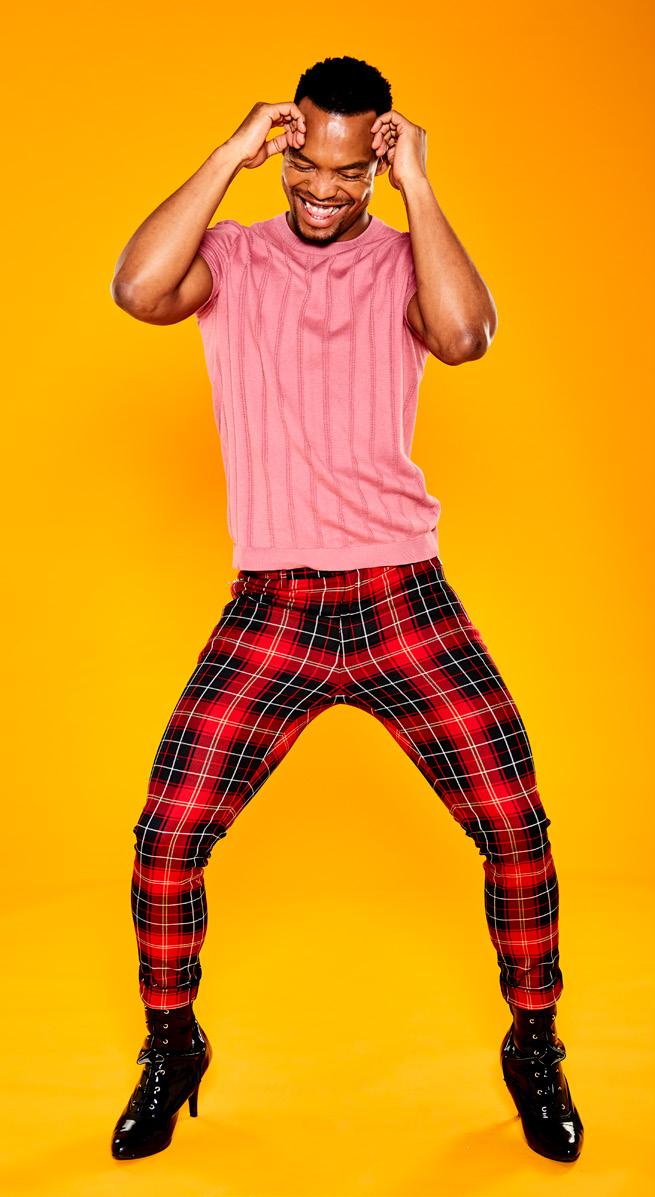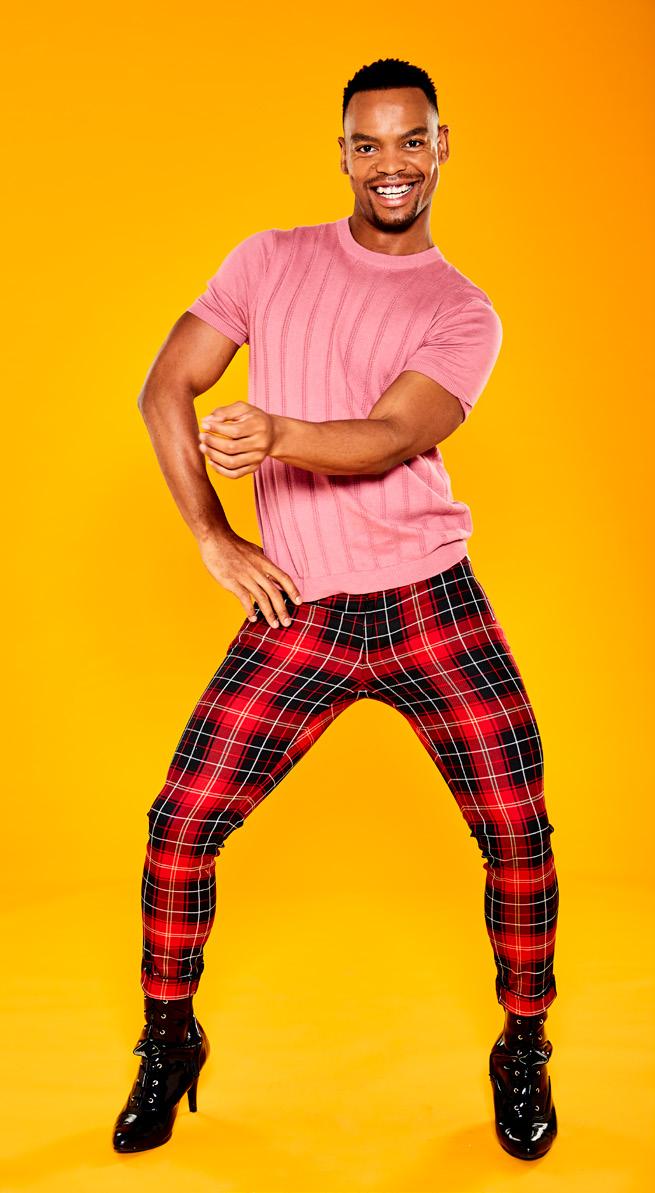
12 minute read
Head over heels
from Happiful March 2020
by Happiful
Breaking boundaries in the ballroom, Johannes Radebe is the Strictly Come Dancing professional who’s captured the nation’s heart – and he’s certainly got our attention, too.
By performing in the show’s first ever same-sex routine in 2019, and dancing up a storm in heels, Johannes is shattering gender stereotypes and putting representation on the map in mainstream media.
Yet the journey to utterly embracing himself wasn’t always easy. But through bullying, homelessness, and grief, he’s remained true to himself, and it’s beyond refreshing...
Interview | Gemma Calvert
Photography | Paul Buller
Of all the hello hugs shared with celebrities, rarely have I been as impressed as when Strictly Come Dancing pro Johannes Radebe arrives at Happiful’s south London studio, wrapped up against the January frost in a woollen pea coat and oversized scarf. A big grin is pursued by an even bigger, heartfelt embrace, and in 10 seconds flat, I’m sold.
After 22 years of dance training, the South African-born star possesses a body built of muscle, but his character is gentle and beautifully exposed. After sinking into a leather sofa at the rear of the studio, away from the hubbub of photoshoot preparations, the dancer and choreographer is instantly at ease. He underscores what he says with smiles aplenty – like when he expresses adoration for his “best friend”, fellow Strictly pro Graziano Di Prima, who he was with the night before, performing on the fourth night of the Strictly Come Dancing live tour.
“I spend every single day with him, mostly because his girlfriend isn’t with us. He hangs on to me for dear life but, the truth is, we need each other!” says Johannes, who joined Strictly in 2018, but enjoyed his first celebrity pairing in 2019 when he and former Coronation Street actress Catherine Tyldesley coupled up. They lit up the dance floor until week six.
Touring with the Strictly pros, enthuses Johannes, is “like being on holiday with your best mates” and even though many have secured lucrative gigs outside the hit BBC1 show – such as Oti Mabuse on The Greatest Dancer, and AJ Pritchard who joined RuPaul’s Drag Race UK as a dance coach – he insists there is never jealousy between the cast.
“The pie’s big enough for everybody. We don’t live in the competitive world anymore. Not to say that the competition isn’t rife when we come to Strictly, because we all want to win, but we’re all different. We all have our qualities. It’s so nice amongst the pros. They’re all kind. It’s been so great.”
Now 32, Johannes finds himself at a fascinating moment in his career, and has every reason to be cheerful. For one, he is finally at home in his own skin. Three months before we meet, a fortnight before he and Graziano danced in the show’s first same-sex routine, Johannes slayed a pro dance sequence, performing to ‘Fame’ in a pair of high-heeled PVC boots. It set the Twittersphere ablaze, with Strictly fans commending him for breaking the mould of gender stereotypes. It also, he says, attracted a flurry of praise from “older gay men” who “identified with the boldness and the confidence”.
“That was my coming out party to the world,” grins Johannes, revealing that when show bosses proposed the idea he agreed, not to publicly shout about being openly gay, but to educate his extended family back home. While Johannes has “always known” he is gay and never hidden his sexuality, he says some relatives were still asking at family functions when he would “come home with a wife and kids”.
Johannes, who concedes that in Africa there is a generational gap of LGBTQ+ education and acceptance, sighs. “It’s a reality, but we live in such progressive times, and I realised there’s no need to hide any more,” he says. “The world has been ready, all I had to do was embrace who I am fully, fully, fully, because that was always my fear – that sense of rejection, that feeling of ‘if I do this, what if somebody mocks me? I don’t want to bring shame to my family.’ It took me 32 years to finally accept that and say, ‘Honestly, this is my life.’”
Johannes believes historically there’s been insufficient media representation of LGBTQ+ minorities, but has observed an improvement over the past two years. He was “inspired” by groundbreaking US series Pose, which delves into the New York City ballroom scene at the height of the AIDS crisis, and accepts credit for his own role in the acceptance of greater diversity within society.
“I’m the change. Honestly, I see it like that. I’m the first gay black man on Strictly. I just think, good for you Johannes. I’m proud!”
In the last series of the Danish version of Strictly, a male duo emerged victorious, and Steps singer Ian ‘H’ Watkins and pro skater Matt Evers were paired on this year’s Dancing On Ice. Surely it’s time for Strictly to regularly feature same sex couples, and to hell with the armchair critics (Johannes and Graziano’s dance attracted 189 complaints to Ofcom)?
“Out of how many million viewers?” says Johannes, instantly putting the protest into perspective. “It’s good that the BBC have started. Whenever they are ready to make that step, they should know there’s representation.”
For Johannes, who never thought he would “have a voice”, being a respected public figure is a responsibility he cherishes. He’s actively planning to align with a LGBTQ+ youth charity, and is intent on making a difference to vulnerable youngsters’ lives. “I hope with my actions I’m breaking barriers, and bringing comfort and assurance that it’s OK,” he says. “Life gets better.”
Which is true. Johannes and his elder sister Pearl grew up in the small South African township of Zamdela, raised by their mother Jacobeth, and dad Benjamin. Curiously, as he describes the “very real struggle” of a “lack of opportunity and finances”, Johannes smiles.




“Going back home humbles me, because you can see how they [survive] with as little as they have,” he says. “As a child, I didn’t know what we lacked, because I had my dad and I had mum, and with all that lack there was love – lots and lots of love and encouragement.”
Johannes began dancing at the age of seven, and at “10 or 11” got his first pair of dancing shoes, a gift from his dad.
“That was his way of saying ‘I approve’. I was dancing my third competition, and while he wanted me to be a soccer star – he thought dance was going to be a phase – he gave me the freedom to explore. Our neighbourhood wasn’t the safest, so he loved that after school, I had somewhere to go and I was off the streets. Dance was my escape. It became my world, my refuge.”
Johannes’ hobby and his “flamboyant demeanour” made him a target for bullies, but at dance school and in the family home, he was free. He adoringly describes his mother as his “best friend”, “queen” and “biggest counsellor” – a woman who didn’t bat an eyelid when she discovered her teenage son squeezing his size 11 feet into Pearl’s high heels. “I used to hang out with my mother all the time, experimenting with all these things in front of her, and she just did not care, honestly, and in that regard, thank God for my mum,” says Johannes.
At school, the abuse Johannes endured was predominantly verbal, but on one occasion turned physical when he got into a fight with a bully, and the perpetrator returned with a baseball bat. “I thought ‘This is it.’ That’s the worst it got,” shudders Johannes, still grateful for the onlookers who stepped in before damage was done. The words fired at him as a young boy, and the anticipation of physical violence, must have been incredibly wounding? He nods. “It left me confused, feeling like there was something wrong with me. It was isolating. For the longest time I thought ‘I’m not worthy,’ and ‘Why are you putting yourself through this?’ I could have easily left dance because it brought all that attention to me but, at the same time, it made me so happy.”
Adolence is rife with challenges, particularly for LGBTQ+ teens – with one study from the Children’s Society revealing that half of gay or bisexual 14-year-olds had self-harmed.

It’s a devastating statistic, that speaks volumes to under-supported demographic, and one that Johannes has seen play out in front of him.
“I lost a friend of mine. He was 10 or 11 and in school with me. Talk about flamboyant and OTT, he was mighty gay and he had it harder than me. He deflected the attention from me so many times, and protected me. As young as I was, when that happened, I understood where he was coming from. He had it hard.”
His friend’s suicide wasn’t the only loss Johannes experienced as a youngster. When he was 14 his father, who had then separated from his mother, died aged 46 from tuberculosis – a neglected disease which still kills more than 100,000 South Africans every year. The heartbreaking period of grief propelled Johannes to make a life-changing decision, and accept an offer to enrol at a dance school for disadvantaged youngsters in Johannesburg, 111 miles from home.
For four years, under the family’s guidance and inspired by his dance idols Bryan Watson, Jason Gilkison, and Motsi Mabuse – who he now works with on Strictly – Johannes honed his versatility as a performer. He trained in ballroom, Latin, contemporary, jazz, and ballet, and established a steadfast work ethic, dancing in shopping malls and parking lots to fund entry and travel to national dance competitions. To this day, he remains the undefeated South African Latin champion.
Despite trying to continue his studies, financial woes eventually saw Johannes quit in favour of employment in Johannesburg, appearing in a stage show and teaching dance to the elderly. But for two years, before getting his “break” on a cruise ship, Johannes lived rough, sleeping in the doorway of a city-centre taxi rank, and showering in shopping mall toilet facilities, all so he could save money to send home to his family. It was during this ordeal that he had the biblical verse ‘no weapon formed against me shall prosper’ tattooed on to his ribs.
“That was my mantra for the longest time. I come from a family of very strong personalities. My mother and my aunts are my pillars of strength. But looking back, I was so miserable, and I can’t tell you where the courage to do that came from,” says Johannes, quickly correcting himself. “I actually tell you lies. It was all because I needed to provide for my family. That was so important.”
It still is. Johannes sends home a portion of his Strictly earnings, but now the gesture comes without sacrifice. He rents an apartment in north London, and is househunting in South Africa for his own place, plus one for his mum.
I ask what his father would make of his achievements. The question prompts Johannes’ chin to fall to his chest.
“Dad’s death was a sad one, because it was quick. We were very close…” he says, his voice momentarily disappearing. “I think dad would have been very proud. Mostly, I think he would have been shocked that I had the courage to do what I’ve done. The fact he didn’t get to see all this unfold leaves me feeling sad at times, but I’m happy I did it and I’m sure, wherever he is, he is happy, too.” As our time together draws to a close, I wonder whether Johannes unwittingly carried the shame he endured as a boy into adulthood and, if so, what effect his two game-changing Strictly performances and the subsequent “incredible” response of his wider family have had on his mindset.
“Yes I did,” he confirms. “When I’ve got people coming up to me, saying ‘Johannes, you’re such a wonderful person,’ I think ‘Maybe there’s actually nothing wrong with me, after all this time.’ It’s a beautiful feeling. Being in this country has been very liberating. It’s nice to settle in a place where I feel I’m seen, where there’s much more freedom, and people are more liberated and progressive.”
As Johannes has always sought counsel from family and friends who have kept him “in check”, what is his advice to loved ones of LGBTQ+ youngsters?
“Love and show support,” he says firmly. “Make sure they know there’s nothing wrong with them. I’ve been blessed to come across people who, when I was being bullied in the middle of the street, would bring it to order and say ‘That’s not right.’ We need to live in a world where we’re not afraid to stand up to what’s wrong, because what I do in my bedroom has nothing to do with you. I don’t dictate how you should live your life, so why are you telling me how to live mine?”
While Johannes’ last relationship was three years ago and shortlived – the nomadic life of a dancer doesn’t always lend itself well to long-term commitment – if the right opportunity presented itself, he would leap at the opportunity to settle down.
“I wish I had a boyfriend. I’m not saying it’s the one thing that’s missing, but it would be nice to come home to somebody. I’m not young anymore! I would like to be with somebody who’s going to take this all the way,” he says, referring to marriage and children.
As for the next step in his career? That’s simple. “I want to continue the Strictly journey for as long as I can,” he says. “It’s a once in a lifetime opportunity, – as long as they’ll have me, I’ll come back.” After the shoot wraps, I bump into Johannes on the street outside before he heads off to resume his Strictly tour duties. “You can’t keep away from me!” he laughs, and there’s no point denying it. When kindness, graciousness, emotional generosity, inner strength, and a desire to help others combine, the allure is truly captivating.
Johannes will be appearing in the Strictly Professionals Tour from May 2020. Find him @johannesradebe on Instagram.

Styling | Krishan Parmar Grooming | Alice Theobald at Joy Goodman using Morgan’s Pomade and Babyliss Pro








